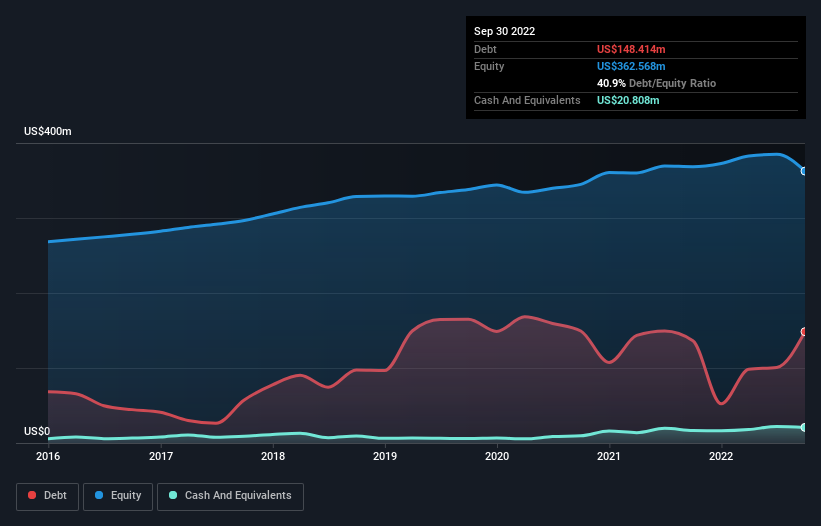
Warren Buffett famously said, 'Volatility is far from synonymous with risk.' When we think about how risky a company is, we always like to look at its use of debt, since debt overload can lead to ruin. We can see that American Vanguard Corporation (NYSE:AVD) does use debt in its business. But should shareholders be worried about its use of debt?
Why Does Debt Bring Risk?
Debt and other liabilities become risky for a business when it cannot easily fulfill those obligations, either with free cash flow or by raising capital at an attractive price. In the worst case scenario, a company can go bankrupt if it cannot pay its creditors. While that is not too common, we often do see indebted companies permanently diluting shareholders because lenders force them to raise capital at a distressed price. Having said that, the most common situation is where a company manages its debt reasonably well - and to its own advantage. The first thing to do when considering how much debt a business uses is to look at its cash and debt together.
Our analysis indicates that AVD is potentially overvalued!
How Much Debt Does American Vanguard Carry?
You can click the graphic below for the historical numbers, but it shows that as of September 2022 American Vanguard had US$148.4m of debt, an increase on US$136.3m, over one year. However, it does have US$20.8m in cash offsetting this, leading to net debt of about US$127.6m.

A Look At American Vanguard's Liabilities
According to the last reported balance sheet, American Vanguard had liabilities of US$219.9m due within 12 months, and liabilities of US$193.7m due beyond 12 months. On the other hand, it had cash of US$20.8m and US$206.7m worth of receivables due within a year. So it has liabilities totalling US$186.1m more than its cash and near-term receivables, combined.
This deficit isn't so bad because American Vanguard is worth US$658.2m, and thus could probably raise enough capital to shore up its balance sheet, if the need arose. But we definitely want to keep our eyes open to indications that its debt is bringing too much risk.
We measure a company's debt load relative to its earnings power by looking at its net debt divided by its earnings before interest, tax, depreciation, and amortization (EBITDA) and by calculating how easily its earnings before interest and tax (EBIT) cover its interest expense (interest cover). Thus we consider debt relative to earnings both with and without depreciation and amortization expenses.
American Vanguard's net debt to EBITDA ratio of about 1.8 suggests only moderate use of debt. And its strong interest cover of 15.5 times, makes us even more comfortable. It is well worth noting that American Vanguard's EBIT shot up like bamboo after rain, gaining 75% in the last twelve months. That'll make it easier to manage its debt. There's no doubt that we learn most about debt from the balance sheet. But ultimately the future profitability of the business will decide if American Vanguard can strengthen its balance sheet over time. So if you want to see what the professionals think, you might find this free report on analyst profit forecasts to be interesting.
But our final consideration is also important, because a company cannot pay debt with paper profits; it needs cold hard cash. So we clearly need to look at whether that EBIT is leading to corresponding free cash flow. Over the last three years, American Vanguard actually produced more free cash flow than EBIT. There's nothing better than incoming cash when it comes to staying in your lenders' good graces.
Our View
Happily, American Vanguard's impressive interest cover implies it has the upper hand on its debt. And that's just the beginning of the good news since its conversion of EBIT to free cash flow is also very heartening. Looking at the bigger picture, we think American Vanguard's use of debt seems quite reasonable and we're not concerned about it. After all, sensible leverage can boost returns on equity. Another factor that would give us confidence in American Vanguard would be if insiders have been buying shares: if you're conscious of that signal too, you can find out instantly by clicking this link.
If, after all that, you're more interested in a fast growing company with a rock-solid balance sheet, then check out our list of net cash growth stocks without delay.
New: Manage All Your Stock Portfolios in One Place
We've created the ultimate portfolio companion for stock investors, and it's free.
• Connect an unlimited number of Portfolios and see your total in one currency
• Be alerted to new Warning Signs or Risks via email or mobile
• Track the Fair Value of your stocks
Have feedback on this article? Concerned about the content? Get in touch with us directly. Alternatively, email editorial-team (at) simplywallst.com.
This article by Simply Wall St is general in nature. We provide commentary based on historical data and analyst forecasts only using an unbiased methodology and our articles are not intended to be financial advice. It does not constitute a recommendation to buy or sell any stock, and does not take account of your objectives, or your financial situation. We aim to bring you long-term focused analysis driven by fundamental data. Note that our analysis may not factor in the latest price-sensitive company announcements or qualitative material. Simply Wall St has no position in any stocks mentioned.
About NYSE:AVD
American Vanguard
Through its subsidiaries, develops, manufactures, and markets chemical, biological and biorational products for agricultural, commercial, and consumer uses in the United States and internationally.
Good value with imperfect balance sheet.
Similar Companies
Market Insights
Community Narratives



